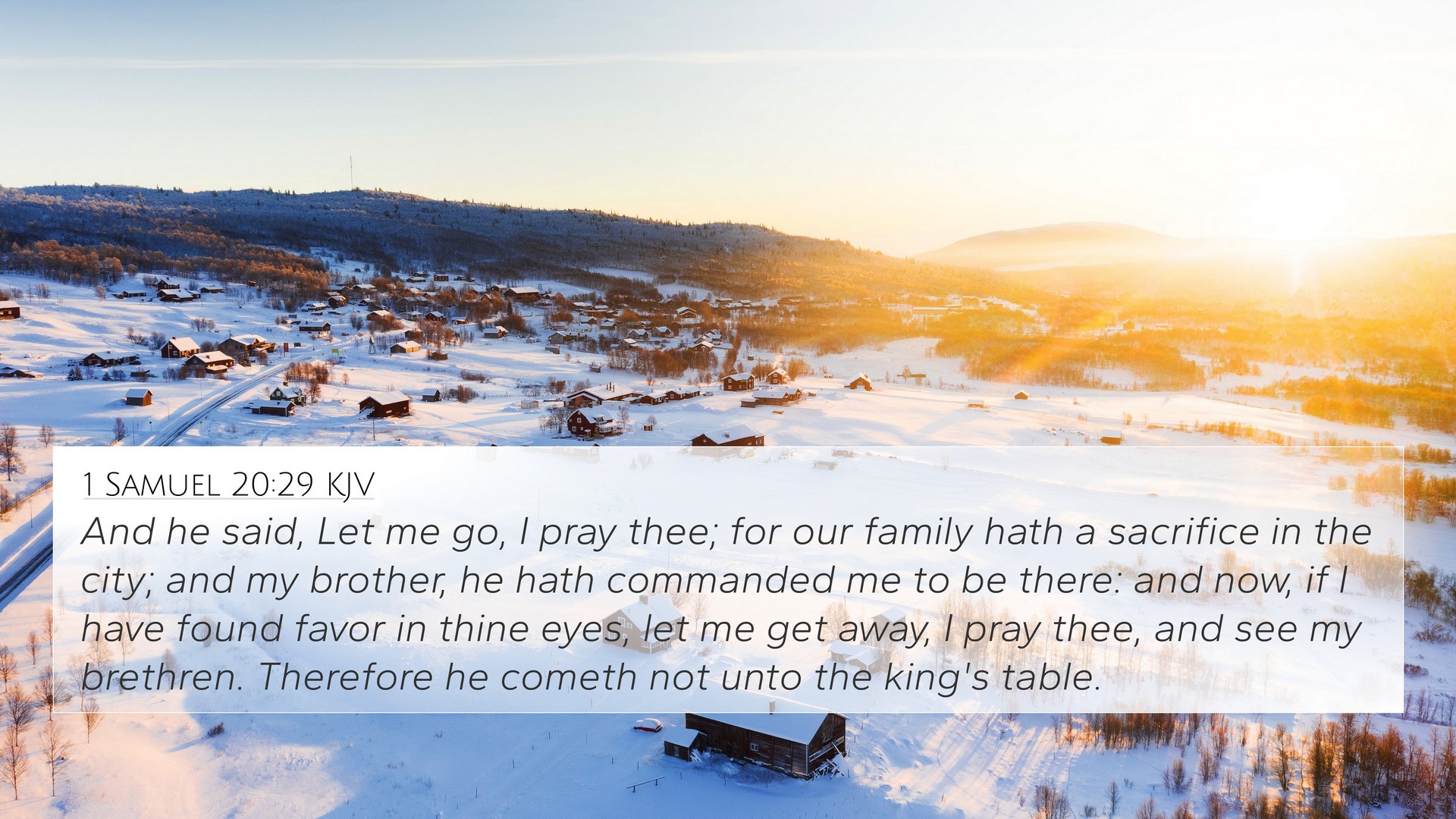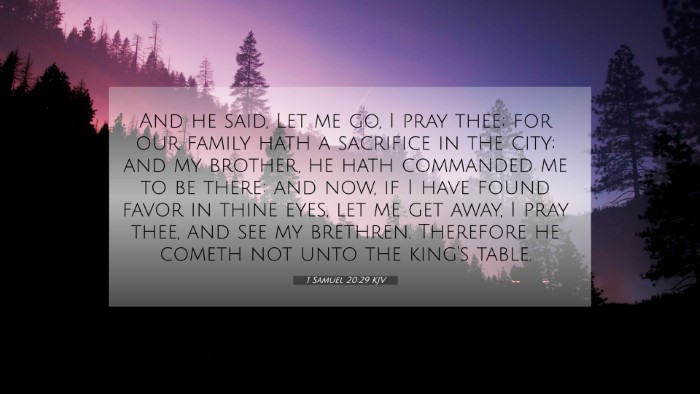Meaning and Interpretation of 1 Samuel 20:29
In 1 Samuel 20:29, we encounter a scene filled with tension and deep personal emotion. This verse illustrates the complex relationships between David, Jonathan, and King Saul. The context of this verse is critical for understanding its significance.
Context Overview
Jonathan, the son of King Saul, is in a precarious situation. His friendship with David, whom Saul perceives as a threat to his throne, forces him to navigate loyalty to his father and friendship with David. The outdoors setting of the verse highlights secrecy and risk, as Jonathan relays Saul’s intentions to David.
Verse Breakdown
1 Samuel 20:29 states:
"And he said, ‘Let me go, for our family has a sacrifice in the city, and my brother has commanded me to be there. If I have found favor in your sight, let me get away, I pray you, and see my brothers.’ Therefore he came not unto the king’s table." (1 Samuel 20:29, KJV)
Key Themes
- Deception and Survival: Jonathan’s plea is a ruse to protect David, showing the lengths to which he will go to safeguard his friend.
- Family and Loyalty: This verse underscores the complex nature of familial ties and friendships. Jonathan prioritizes David’s safety over his father’s desires.
- Faith and Trust: David's eventual reliance on Jonathan reflects a profound trust that transcends familial obligations.
Commentary Insights
Matthew Henry notes that this verse is a significant moment, demonstrating the tension between familial loyalty and true friendship. He emphasizes how Jonathan's words illustrate his role as a mediator between David and Saul.
Albert Barnes expands on the notion of sacrifice in this verse, highlighting how the notion of family sacrifices serves as a good cover for the secretive mission Jonathan is undertaking to protect David.
Adam Clarke reflects on the emotional weight of Jonathan’s actions, highlighting how this verse encapsulates the pain of torn loyalties that characterize the lives of those who value love above mere obligation.
Bible Verse Cross-References
Understanding this verse in relation to other scriptures can enhance its meaning:
- 1 Samuel 18:1-4 - The covenant of friendship between Jonathan and David.
- 1 Samuel 19:1-7 - Jonathan’s loyalty to David in the face of Saul’s jealousy.
- 2 Samuel 1:26 - David's lamentation for Jonathan's death showcases their deep bond.
- Proverbs 18:24 - "There is a friend who sticks closer than a brother," reflecting Jonathan and David's relationship.
- Matthew 12:48-50 - Jesus speaks of family ties, illustrating the shifting nature of relationships.
- Luke 14:26 - The call to prioritize discipleship over family, paralleling Jonathan’s dilemma.
- Romans 12:10 - The instruction to love one another tenderly, indicative of Jonathan’s love for David.
Comparative Bible Verse Analysis
This verse opens up discussions on various themes that run through both the Old and New Testaments, allowing for an engaging cross-referencing Bible study. By looking at the connections between Jonathan and David, we can find similarities with:
- Esther 4:16 - The risk of personal safety for the greater good and loyalty to friends.
- John 15:13 - "Greater love hath no man than this," illustrating the power of self-sacrifice in friendship.
Tools for Bible Cross-Referencing
Understanding how to navigate and utilize cross-referencing can deepen your Bible study:
- Bible Concordance: Use a concordance to locate themes and related verses quickly.
- Bible Cross-Reference Guide: Reference guides can offer structured insights into verse connections.
- Cross-Reference Methods: Techniques such as thematic analysis can reveal deeper meanings in linked verses.
Conclusion
1 Samuel 20:29 serves as a profound expression of friendship, loyalty, and the complexity of human relationships in the biblical narrative. By engaging with public domain commentaries and examining cross-referenced scriptures, one can appreciate the depth and richness of this passage.



